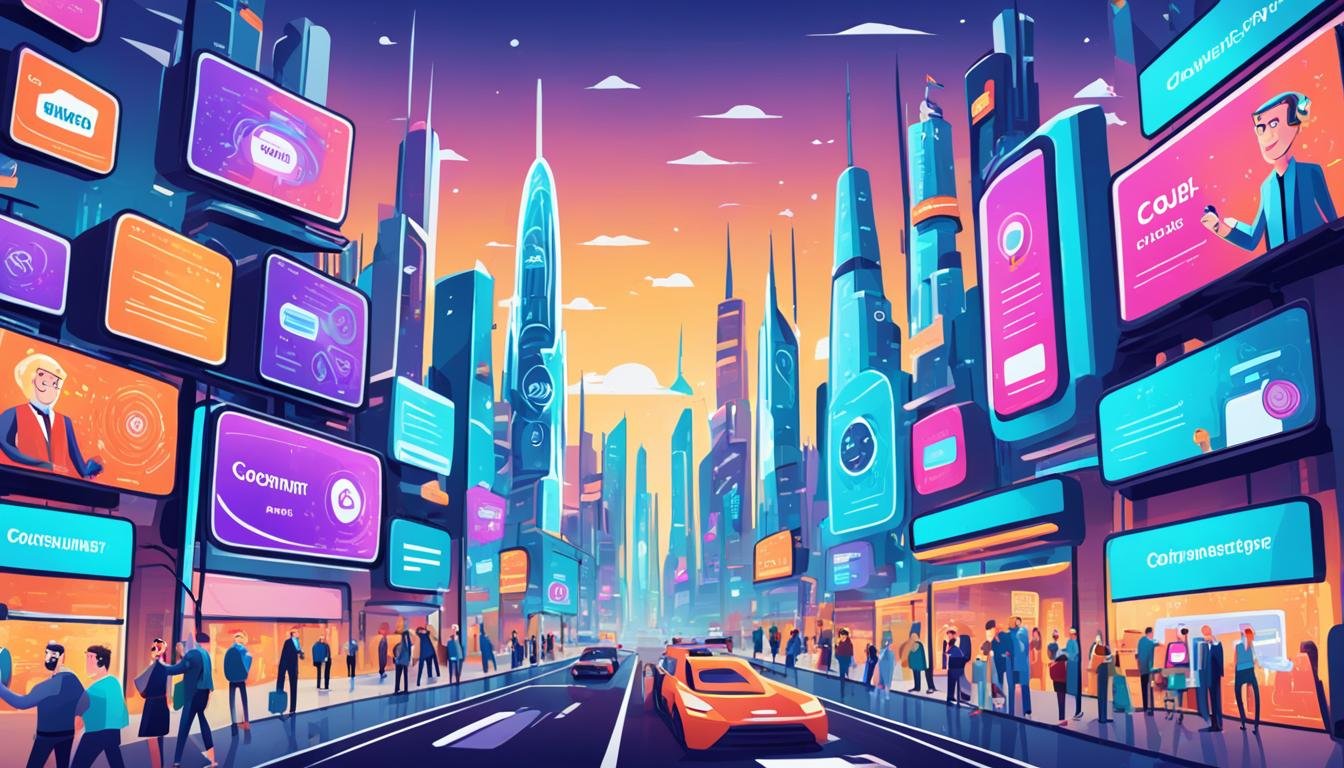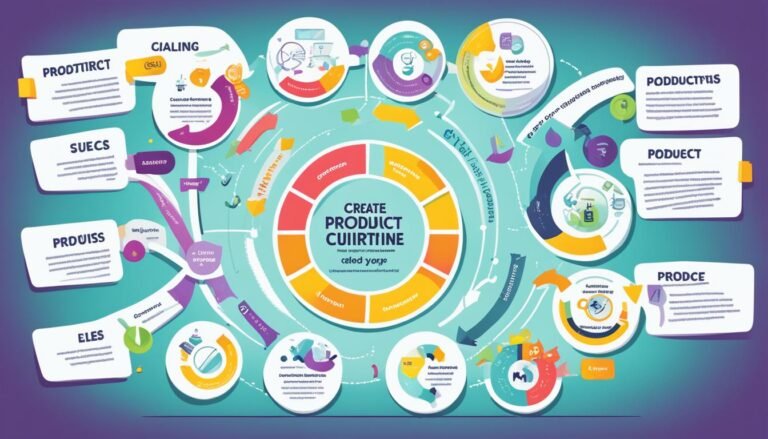The Role of Artificial Intelligence in Marketing
Did you know that nearly 90% of marketers think their companies need to use more AI to stay ahead and meet customer needs? A 2023 Mailchimp report shows AI is key in today’s fast digital world. It’s not just a future idea but a must-have for success.
Tools like Sprout Social use AI to check about 50,000 customer messages every second and up to 600 million daily. This gives quick insights into what customers want. AI can look through millions of data points fast, giving insights for marketing in just a few minutes. This is much quicker than old methods that took hours or days.
Now, over 70% of customers want companies to talk to them in a personal way. AI helps make this happen. By 2025, marketing teams using AI will spend 75% of their time on big-picture tasks, not just making content. This shows AI is a big part of changing how we market online.
AI is a must for marketers who want to make strategies and campaigns that really speak to people. It uses things like natural language processing and machine learning. This helps marketers keep up with what customers want and how the market is changing.
Key Takeaways
- 90% of marketers believe more AI use is key to staying competitive.
- Tools like Sprout Social quickly analyze customer messages for insights.
- Predictive analytics make looking through data much faster than before.
- AI meets the need for personal interactions with customers.
- By 2025, AI will let marketing teams focus more on big-picture tasks.
- AI is vital for understanding and predicting what consumers will do.
- Marketers need AI to make marketing campaigns that really connect with people.
Introduction to AI in Marketing
Artificial Intelligence (AI) is changing the way we market today. This change shows how AI is becoming key in digital marketing. It’s expected to boost 45% of the global economy by 2030, showing its big role in the future.
The Evolution of AI in Digital Marketing
AI has revolutionized digital marketing. It started with recommendation engines at Amazon and Netflix. Now, AI helps make customer experiences personal by learning what users like.
It uses machine learning to suggest products that fit what users want. This makes customers more engaged and happy. Semantically clustering keywords helps companies understand what people are saying, making their products better match what customers need.
AI also quickly finds important info in social media, looking at millions of points to give useful insights. This has led to better marketing strategies, more personal touches, and smarter ways to reach customers across different channels.
The Growing Importance of AI
AI is becoming more important in marketing, giving businesses new insights and efficiency. AI tools can quickly handle negative comments about brands, helping improve how brands are seen. It also helps understand social media data better, making it easier to keep an eye on competitors.
AI helps create content, automate tasks, and segment audiences for more targeted marketing. This builds loyalty and gets customers more involved. Companies using AI see better sales, higher returns, and save more money. Marketers use AI to get real-time info on what customers think, keeping their strategies sharp and effective.
As competition grows, using AI is essential, not just an edge. AI keeps changing how we market, making it a key part of modern marketing.
AI Marketing Strategies for Modern Businesses
The world of AI in marketing is changing fast, offering new ways for marketers to boost their strategies. By using AI marketing strategies, businesses can work more efficiently and effectively. Thanks to intelligent marketing tools, companies can analyze data quicker and make campaigns better, saving a lot of time.
Chatbots like ChatGPT are now used to automate tasks, including coming up with ad ideas and writing copy. AI also improves ad targeting by using past data to predict how well ads will do and make them better, giving a big edge in modern business tactics.
AI does more than just automate; it plays a big part in making and improving content. AI tools help with coming up with ideas, checking for errors, and testing different versions of ads, leading to smarter choices. Also, AI-driven marketing strategies use advanced sentiment analysis to understand how people feel, making insights better and improving engagement.
AI-powered tools for translating languages are key for marketing to different cultures, making sure messages are clear and relevant. Companies use AI to create bots that talk to customers in a way that feels personal, making customers happier and more loyal.
AI is also great for setting prices based on current data and what competitors do. Tools that predict the market help businesses use their resources wisely for the best return on investment. AI can also predict how successful marketing campaigns will be by looking at past data, like how people interact with emails, helping marketers make their marketing strategies better.
Using AI in marketing is becoming essential, not just a trend. Recent numbers show that 64% of marketers use AI in their work, with 21% using it a lot every day. The main uses are analyzing data, creating content, and doing research, all to do better and make more money. Also, using AI and automation saves marketers about two hours and 24 minutes a day, showing how big a role AI plays in changing marketing.
Machine Learning for Marketing: Enhancing Customer Insights
Machine learning has changed the way we market, giving us deep insights into what customers want. It’s great at finding out what customers like, guessing what they’ll buy, and understanding how they interact with brands. As it keeps getting better, it’s becoming key for analyzing data, making predictions, and understanding customer behavior. This helps businesses grow and work smarter.
Understanding Customer Behavior
Using machine learning in marketing helps us deeply understand how customers act. It looks at huge amounts of data to find patterns and trends we might not see. This detailed data analysis shows what makes customers do what they do. It lets marketers make their ads more targeted and personal.
Data Analysis and Predictive Modeling
Predictive modeling is a big deal in marketing thanks to machine learning. It uses data to guess what customers will do next, giving businesses useful tips. This helps them use their marketing money better and make strategies that hit the mark with their audience. Predictive modeling makes marketing campaigns more successful.
AI and machine learning also help with better customer groups, quick decisions, and automating campaigns. With new tech like NLP and computer vision, marketers can make content more personal. This makes customers stick with a brand more and have a better experience.
In short, machine learning is key for understanding and predicting what customers will do. It gives businesses a boost in analyzing data and making predictions. These advances make marketing more efficient and help businesses connect better with customers, leading to more profit.
Predictive Analytics in Marketing: Forecasting Trends and Behaviors
Predictive analytics helps marketers predict trends and customer actions. It uses advanced AI to analyze huge amounts of data. This reveals important patterns and insights.
Using predictive analytics, businesses can make customer experiences more personal. They can automate tasks and boost their marketing ROI.
Strategies for Leveraging Predictive Analytics
Here are ways to use predictive analytics in marketing:
- Customer Segmentation: Predictive models help marketers target specific groups better.
- Dynamic Content Optimization: AI makes it possible to change content in real-time. This personalizes messages and product suggestions.
- Lead Scoring: AI predicts which leads are most likely to convert. This helps marketers focus their efforts.
- Churn Prediction: Models spot customers likely to leave. Marketers can then keep them from leaving, improving customer value.
- Pricing and Budgeting: Algorithms adjust prices and marketing budgets to get the best ROI and growth.
Case Studies of Predictive Analytics Success
Many case studies show how predictive analytics helps in marketing:
- Amazon’s Personalization Approach: Amazon uses algorithms to suggest products based on what customers like. This keeps customers coming back and buying more.
- Spotify’s Recommendation Systems: Spotify uses deep learning and NLP to make playlists just for you. This keeps users listening longer.
- Proactive Churn Management: Telecom companies use predictive models to find customers at risk. They then work to keep them from leaving, cutting down on churn.
- Enhanced Lead Management in B2B Marketing: Predictive lead scoring helps companies focus on the best leads. This makes lead management more efficient and boosts sales.
Predictive analytics gives marketers a powerful tool to forecast trends and optimize campaigns. By looking at big datasets, businesses can make smarter decisions. This helps them stay ahead in the market.
The Role of Artificial Intelligence in Marketing: A Comprehensive Overview
AI technology has changed the marketing world, giving businesses new tools to boost their marketing. By using AI in customer engagement, companies can better understand what customers like. This tech looks at huge amounts of data quickly, finding patterns and connections hard for people to see.
AI changes the game with automated campaigns. Marketers can now focus more on new ideas like augmented reality and voice search. With targeted marketing strategies, AI makes sure ads reach the right people, making campaigns more effective.
Generative AI can help create content that reflects diverse cultural perspectives, increasing the inclusivity and accessibility of messaging for a broader audience.
The future of AI in marketing looks bright, with new uses like predicting from unorganized data and using first-party data for AI content. AI automation means marketing teams can spend more time on creative and strategic work.
Studies, like those from the Society for Industrial and Organizational Psychology (SIOP), show AI as a top trend in the workplace. Big names like Google and Spotify are using AI in their marketing, proving its big impact today.
The growth of AI in marketing is huge. It went from $10.1 billion in 2018 to a predicted $126 billion by 2025. AI is here to stay, changing marketing with its deep customer insights, automated processes, and sharp targeted marketing strategies.
Personalized Marketing with AI: Creating Tailored Customer Experiences
In today’s world, making marketing personal is key. AI helps businesses create tailored customer experiences by looking at what each person does and likes. Last year, we made about 79 zettabytes of data, and that’s expected to jump to 181 zettabytes by 2025. This data boom means companies must use AI to stay ahead.
AI automates tasks to understand what customers want in detail. It uses machine learning to spot small groups and target them with what they like. This AI personalization changes based on what users do, making their experience better.
Companies like Amazon, Netflix, and Spotify use AI for personalized tips. Now, AI-powered omnichannel experiences are common for both businesses and consumers. Offering content that feels made just for someone boosts loyalty and sales.
- Enhanced customer experience
- Increased ROI and scalability
- Real-time decision making
AI chatbots also provide 24/7 support, making sure customers get help anytime. They work in many languages, helping users worldwide. By adding AI to marketing, companies can suggest products that really fit what customers want and talk to them in a way that feels right.
But, AI personalization also brings challenges, like privacy worries. It’s important to be clear about how data is used, get user okay, and use strong security. Using AI to help, not replace, people in marketing is the way to go. This approach leads to marketing that’s smart, flexible, and fair, shaping the future of personalized marketing with AI.
Automated Marketing Campaigns: Boosting Efficiency and Effectiveness
AI-driven automation is changing the game in marketing. It makes marketing efficiency and effectiveness much better. By automating routine tasks, marketers can spend more time on strategy and creative work. This work needs human smarts and feeling.
Automated marketing campaigns focus on email automation and social media. Using AI in these areas greatly improves efficiency and results.
Email Marketing Automation
Email automation uses AI to send personalized emails at the right time to customers. This saves marketing teams a lot of time and makes customers happier. AI also makes sure emails are sent at the best time, which means more people open and click on them.
Automated emails can sort customers into groups and send them content that fits their interests. This means businesses get more engagement and happier customers. It also means less work for the marketing team.
Social Media Campaign Automation
AI is a big help in social media, making social media campaign efficiency better. Automated systems help schedule posts, check how well they’re doing, and send out content at the best times.
AI figures out when the audience is most likely to see and interact with posts. This means more people see the content and engage with it. It also keeps the brand’s voice consistent across different platforms.
AI can sort social media messages too. This makes it easier to talk to customers in a more organized way. It leads to more loyalty and a real connection between brands and their followers.
Using AI for email marketing automation and social media is key for businesses today. It helps make marketing more efficient and gets better results with less work. With AI getting better all the time, the ways to improve marketing strategies are endless.
AI-Powered Content Creation: Revolutionizing Marketing Materials
AI is changing how we make marketing materials. It makes the process faster and more effective. AI tools save time and keep messages consistent across platforms. They can create high-quality content like articles, blog posts, product descriptions, and marketing copy by analyzing lots of data.
Generating Engaging Content
AI tools use advanced algorithms and Natural Language Processing (NLP) to understand and mimic human language. This leads to content that grabs attention. Tools like GPT-3 and DALL-E help marketers make content for social media, email newsletters, and videos that speaks to their audience.
These tools also look at what users like to see, making content more personal. This can increase how much people engage with the content and stay interested.
Optimizing Content for SEO
AI is also great for SEO content optimization. Tools like Grammarly and HubSpot’s Content Strategy tool make creating content easier. They offer automated editing, readability checks, and grammar tips. AI can also test different versions of marketing materials to see what works best, improving results and return on investment.
By keeping a consistent tone and style, brands can keep their message clear across all content. This helps keep their brand strong.
In conclusion, AI is changing marketing by offering new ways to create and optimize content. With these tools, businesses can make content that is engaging, high-quality, and SEO-friendly. This helps meet marketing goals and improve the customer experience.
Source Links
- The Role of Artificial Intelligence in Marketing
- Artificial Intelligence And The Future Of Marketing
- The role of artificial intelligence in marketing
- The Role of Artificial Intelligence (AI) in Marketing
- What is AI Marketing? A Complete Guide | Marketing Evolution
- AI marketing: A guide to using AI in your marketing strategy | Zapier
- AI in Digital Marketing — The Complete Guide
- The Role of Artificial Intelligence in Digital Marketing
- AI in marketing: How to leverage this powerful new technology for your next campaign – IBM Blog
- Predictive Analytics for Marketing: Revolutionizing Strategies with AI-Driven Insights
- Predictive Analytics: Leveraging AI for Data-Driven Marketing | ER Marketing
- What is AI Marketing?
- The evolving role of artificial intelligence in marketing: A review and research agenda
- How AI Improves Customer Experience Personalization | Monetate
- The Role of AI in Personalized Marketing
- Council Post: AI And Personalization In Marketing
- Automating Marketing Operations with AI: A New Era of Efficiency and Personalization | Thoughtful
- The Power of AI Marketing Tools: Redefining Digital Marketing
- The Role of AI in Marketing Automation
- How AI is Revolutionizing Content Creation and Marketing
- The Role of AI in Content Creation







